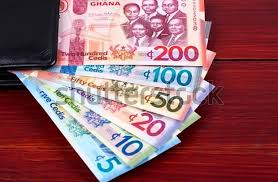
Adnan Adams Mohammed
The Ghanaian local currency is expected to gain in value as Ghana awaits the International Monetary Fund Executive Board’s approval of US$360 million as the fourth tranche of the US$3.0 billion Extended Credit Facility.
The subsequent disbursement of the $360 million is expected to hit Bank of Ghana in early this month.
As it has been the normal cycle of much pressure exerted on the local currency within the last quarter of the year as traders increase imports of goods (foods, clothes etc) for the festive seasons of Christmas and new year. This situation normally causes scarcity of major trading foreign currencies such as the US dollar, Pounds Sterling, Euro, and a Chinese Yuan. Thus, making the forex market resorting to distortions and ‘black marketing’ consequently forcing the banks to also following the prevailing black market prices. However, with the expected $360 million from IMF, the banks could have more dollars to sell to traders for their imports, thereby reducing the over-relayance on the black market.
“The board is set to meet in early December and approve the disbursement of US$360 million to Ghana”, the Director of Communications at the IMF Julie Kozack at a press conference in Washington.
“We are working, our staff are working toward a board meeting in early December and will provide additional details on the precise date when we have them”, she added.
Meanwhile, the Fund has shown confidence in the country’s economy recounting remarkable progress made towards recovery and improvement in the macroeconomic indicators.
“Economic growth in the first half of 2024 exceeded our expectations, exceeded our projections. Inflation has declined and the fiscal and external positions have shown marked improvement”, Ms Kozack said.
“Looking ahead, what will be important for Ghana will be continued implementation of the policy and reform agendas, especially given the difficult situation that many countries in the region and globally face. And it remains essential to fully restore macroeconomic stability and debt sustainability”.
“We will, of course, have further updates on Ghana when we release the staff report, when we publish the staff report after the board meeting”, she added.
On October 4th, the IMF staff and government reached a staff level agreement on economic policies and reforms for the third review of the ECF arrangement.
The disbursement by the IMF Board in December 2024 will bring the total funds received since Ghana signed up for the IMF programme to $1.92 billion.
The board meeting in December is coming after Ghana passed most of the benchmarks set under the third review by the IMF programme.
The IMF staff at the end of the third review assessment indicated that all the end-June 2024 quantitative targets were met, and progress on key structural reforms has continued notwithstanding delays in a few areas
“The economic growth in the first half of 2024 was much higher than initially envisaged primarily fueled by mining, construction, and information and communication activity, with a broadening of the sources of growth across sectors during the second quarter as inflation continued to decline” The IMF Staff said.